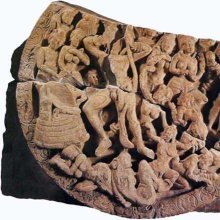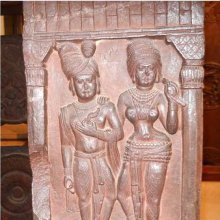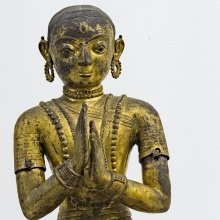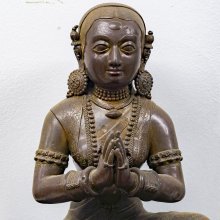Queen: 2 definitions
Introduction:
Queen means something in Buddhism, Pali, the history of ancient India. If you want to know the exact meaning, history, etymology or English translation of this term then check out the descriptions on this page. Add your comment or reference to a book if you want to contribute to this summary article.
Images (photo gallery)
(+13 more images available)
In Buddhism
Tibetan Buddhism (Vajrayana or tantric Buddhism)
Source: ORA: Amanaska (king of all yogas): (Tibetan Buddhism)Queens (in Sanskrit: Rājapatnī) can be attracted/subdued by one having the Siddhi (power) of Speech, according to verse 14.24bd-27 of the Laghuśaṃvara, an ancient Buddhist Yoginī Tantra.—Accordingly: “The Sādhaka [who has] the Siddhi of speech can certainly attract a king or queen (rājapatnī) by [merely] thinking [it]. He quickly controls gods, demons and men. When angry, he can kill with his speech and drive away his adversary. The practitioner can thus effect a curse with his speech [...]”.

Tibetan Buddhism includes schools such as Nyingma, Kadampa, Kagyu and Gelug. Their primary canon of literature is divided in two broad categories: The Kangyur, which consists of Buddha’s words, and the Tengyur, which includes commentaries from various sources. Esotericism and tantra techniques (vajrayāna) are collected indepently.
India history and geography
Source: archive.org: Rajatarangini (Ranjit Sitaram Pandit) (history)Queens of Kashmir, pursuant to the ancient law and convention, were sprinkled with the sacred waters of the coronation side by side with the kings, who shared the throne with their consorts. The queens had separate funds, their own treasurers and councillors and were actively interested in the government of the country. They received the homage of feudatory chiefs when they held open court.

The history of India traces the identification of countries, villages, towns and other regions of India, as well as mythology, zoology, royal dynasties, rulers, tribes, local festivities and traditions and regional languages. Ancient India enjoyed religious freedom and encourages the path of Dharma, a concept common to Buddhism, Hinduism, and Jainism.
See also (Relevant definitions)
Starts with: Queen crape myrtle, Queen flower, Queen of the shores, Queen palm, Queensland bean, Queensland blue gum, Queensland bramble, Queensland ginger, Queensland messmate, Queensland silver wattle, Queensland umbrella tree.
Ends with: Jungle queen, Meadow queen, Purple queen.
Full-text (+1487): Rajni, Rajapatni, Rani, Mahishi, Pattamahishi, Pattadevi, Maharajni, Antahpura, Agramahishi, Rajan, Devi, Sudeshna, Virajni, Pattaroha, Agradevi, Bhattini, Rajini, Avarodhika, Ranirauta, Rukmini.
Relevant text
Search found 260 books and stories containing Queen; (plurals include: Queens). You can also click to the full overview containing English textual excerpts. Below are direct links for the most relevant articles:
Village Folk-tales of Ceylon (Sri Lanka), vol. 1-3 (by Henry Parker)
Story 48 - The Seven Princesses < [Part II (b) - Stories of the Tom-tom Beaters]
Story 24 - How A Prince Was Chased By A Yaksani, And What Befel < [Part I - Stories told by the Cultivating Caste and Vaeddas]
Story 4 - The Glass Princess < [Part I - Stories told by the Cultivating Caste and Vaeddas]
Garga Samhita (English) (by Danavir Goswami)
Verse 6.18.9 < [Chapter 18 - In the Course of Describing the Glories of Siddhāśrama, a Description of the Rāsa-dance Festival]
Verse 1.5.32 < [Chapter 5 - The Lord’s Appearance]
Verses 6.18.17-18 < [Chapter 18 - In the Course of Describing the Glories of Siddhāśrama, a Description of the Rāsa-dance Festival]
Trishashti Shalaka Purusha Caritra (by Helen M. Johnson)
Part 15: Episode of the bath-water < [Chapter IV - The, birth, marriage, and retreat to the forest of Rāma and Lakṣmaṇa]
Part 7: Story of Kanakaśakti < [Chapter III - Eighth incarnation as Vajrāyudha]
Part 4: Continuation of Abhaya and Pradyota story < [Chapter XI - The story of Rauhiṇeya]
Ramayana of Valmiki (by Hari Prasad Shastri)
Chapter 103 - Shri Rama greets the queens < [Book 2 - Ayodhya-kanda]
Chapter 65 - The palace is filled with the sound of distress < [Book 2 - Ayodhya-kanda]
Chapter 57 - Sumantra returns to the stricken city of Ayodhya < [Book 2 - Ayodhya-kanda]
Folk Tales of Gujarat (and Jhaverchand Meghani) (by Vandana P. Soni)
Chapter 9 - Jikaliyo (Story of Purshotam Mas) < [Part 3 - Kankavati]
Chapter 29 - Gai Vrat < [Part 3 - Kankavati]
Chapter 12 - Shravaniya Somvar < [Part 3 - Kankavati]
Middle Chola Temples (by S. R. Balasubrahmanyam)
3. Images set up by his Queens < [Tanjavur/Thanjavur (Rajarajesvaram temple)]
Temples in Ramanathankoyil < [Chapter IV - Temples of Rajendra I’s Time]
Introduction < [Chapter III - Rajendra I (a.d. 1012 to 1044)]
Related products
(+19 more products available)











